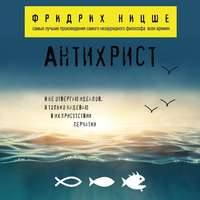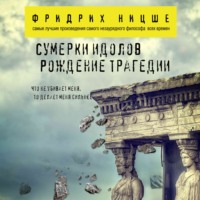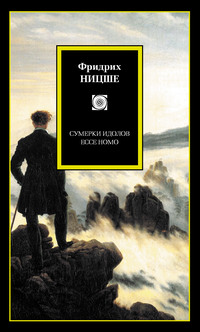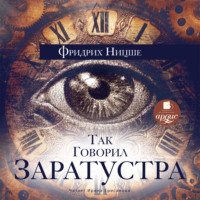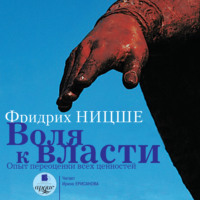 полная версия
полная версияWe Philologists
120
Wanton, mutual annihilation inevitable: so long as a single polis wished to exist – its envy for everything superior to itself, its cupidity, the disorder of its customs, the enslavement of the women, lack of conscience in the keeping of oaths, in murder, and in cases of violent death.
Tremendous power of self-control: for example in a man like Socrates, who was capable of everything evil.
121
Its noble sense of order and systematic arrangement had rendered the Athenian state immortal – The ten strategists in Athens! Foolish! Too big a sacrifice on the altar of jealousy.
122
The recreations of the Spartans consisted of feasting, hunting, and making war · their every-day life was too hard. On the whole, however, their state is merely a caricature of the polls, a corruption of Hellas. The breeding of the complete Spartan – but what was there great about him that his breeding should have required such a brutal state!
123
The political defeat of Greece is the greatest failure of culture; for it has given rise to the atrocious theory that culture cannot be pursued unless one is at the same time armed to the teeth. The rise of Christianity was the second greatest failure: brute force on the one hand, and a dull intellect on the other, won a complete victory over the aristocratic genius among the nations. To be a Philhellenist now means to be a foe of brute force and stupid intellects. Sparta was the ruin of Athens in so far as she compelled Athens to turn her entire attention to politics and to act as a federal combination.
124
There are domains of thought where the ratio will only give rise to disorder, and the philologist, who possesses nothing more, is lost through it and is unable to see the truth · e. g. in the consideration of Greek mythology. A merely fantastic person, of course, has no claim either · one must possess Greek imagination and also a certain amount of Greek piety. Even the poet does not require to be too consistent, and consistency is the last thing Greeks would understand.
125
Almost all the Greek divinities are accumulations of divinities. we find one layer over another, soon to be hidden and smoothed down by yet a third, and so on. It scarcely seems to me to be possible to pick these various divinities to pieces in a scientific manner, for no good method of doing so can be recommended: even the poor conclusion by analogy is in this instance a very good conclusion.
126
At what a distance must one be from the Greeks to ascribe to them such a stupidly narrow autochthony as does Ottfried Muller!10 How Christian it is to assume, with Welcker,11 that the Greeks were originally monotheistic! How philologists torment themselves by investigating the question whether Homer actually wrote, without being able to grasp the far higher tenet that Greek art long exhibited an inward enmity against writing, and did not wish to be read at all.
127
In the religious cultus an earlier degree of culture comes to light a remnant of former times. The ages that celebrate it are not those which invent it, the contrary is often the case. There are many contrasts to be found here. The Greek cultus takes us back to a pre-Homeric disposition and culture. It is almost the oldest that we know of the Greeks – older than their mythology, which their poets have considerably remoulded, so far as we know it – Can this cult really be called Greek? I doubt it: they are finishers, not inventors. They preserve by means of this beautiful completion and adornment.
128
It is exceedingly doubtful whether we should draw any conclusion in regard to nationality and relationship with other nations from languages. A victorious language is nothing but a frequent (and not always regular) indication of a successful campaign. Where could there have been autochthonous peoples! It shows a very hazy conception of things to talk about Greeks who never lived in Greece. That which is really Greek is much less the result of natural aptitude than of adapted institutions, and also of an acquired language.
129
To live on mountains, to travel a great deal, and to move quickly from one place to another. in these ways we can now begin to compare ourselves with the Greek gods. We know the past, too, and we almost know the future. What would a Greek say, if only he could see us!
130
The gods make men still more evil; this is the nature of man. If we do not like a man, we wish that he may become worse than he is, and then we are glad. This forms part of the obscure philosophy of hate – a philosophy which has never yet been written, because it is everywhere the pudendum that every one feels.
131
The pan-Hellenic Homer finds his delight in the frivolity of the gods; but it is astounding how he can also give them dignity again. This amazing ability to raise one's self again, however, is Greek.
132
What, then, is the origin of the envy of the gods? people did not believe in a calm, quiet happiness, but only in an exuberant one. This must have caused some displeasure to the Greeks; for their soul was only too easily wounded: it embittered them to see a happy man. That is Greek. If a man of distinguished talent appeared, the flock of envious people must have become astonishingly large. If any one met with a misfortune, they would say of him: "Ah! no wonder! he was too frivolous and too well off." And every one of them would have behaved exuberantly if he had possessed the requisite talent, and would willingly have played the role of the god who sent the unhappiness to men.
133
The Greek gods did not demand any complete changes of character, and were, generally speaking, by no means burdensome or importunate. it was thus possible to take them seriously and to believe in them. At the time of Homer, indeed, the nature of the Greek was formed · flippancy of images and imagination was necessary to lighten the weight of its passionate disposition and to set it free.
134
Every religion has for its highest images an analogon in the spiritual condition of those who profess it. The God of Mohammed. the solitariness of the desert, the distant roar of the lion, the vision of a formidable warrior. The God of the Christians. everything that men and women think of when they hear the word "love". The God of the Greeks: a beautiful apparition in a dream.
135
A great deal of intelligence must have gone to the making up of a Greek polytheism. the expenditure of intelligence is much less lavish when people have only one God.
136
Greek morality is not based on religion, but on the polis.
There were only priests of the individual gods; not representatives of the whole religion. i. e., no guild of priests. Likewise no Holy Writ.
137
The "lighthearted" gods · this is the highest adornment which has ever been bestowed upon the world – with the feeling, How difficult it is to live!
138
If the Greeks let their "reason" speak, their life seems to them bitter and terrible. They are not deceived. But they play round life with lies: Simonides advises them to treat life as they would a play; earnestness was only too well known to them in the form of pain. The misery of men is a pleasure to the gods when they hear the poets singing of it. Well did the Greeks know that only through art could even misery itself become a source of pleasure, vide tragœdiam.
139
It is quite untrue to say that the Greeks only took this life into their consideration – they suffered also from thoughts of death and Hell. But no "repentance" or contrition.
140
The incarnate appearance of gods, as in Sappho's invocation to Aphrodite, must not be taken as poetic licence · they are frequently hallucinations. We conceive of a great many things, including the will to die, too superficially as rhetorical.
141
The "martyr" is Hellenic: Prometheus, Hercules. The hero-myth became pan-Hellenic: a poet must have had a hand in that!
142
How realistic the Greeks were even in the domain of pure inventions! They poetised reality, not yearning to lift themselves out of it. The raising of the present into the colossal and eternal, e. g., by Pindar.
143
What condition do the Greeks premise as the model of their life in Hades? Anæmic, dreamlike, weak. it is the continuous accentuation of old age, when the memory gradually becomes weaker and weaker, and the body still more so. The senility of senility. this would be our state of life in the eyes of the Hellenes.
144
The naive character of the Greeks observed by the Egyptians.
145
The truly scientific people, the literary people, were the Egyptians and not the Greeks. That which has the appearance of science among the Greeks, originated among the Egyptians and later on returned to them to mingle again with the old current. Alexandrian culture is an amalgamation of Hellenic and Egyptian. and when our world again founds its culture upon the Alexandrian culture, then…12
146
The Egyptians are far more of a literary people than the Greeks. I maintain this against Wolf. The first grain in Eleusis, the first vine in Thebes, the first olive-tree and fig-tree. The Egyptians had lost a great part of their mythology.
147
The unmathematical undulation of the column in Paestum is analogous to the modification of the tempo: animation in place of a mechanical movement.
148
The desire to find something certain and fixed in æsthetic led to the worship of Aristotle: I think, however, that we may gradually come to see from his works that he understood nothing about art, and that it is merely the intellectual conversations of the Athenians, echoing in his pages, which we admire.
149
In Socrates we have as it were lying open before us a specimen of the consciousness out of which, later on, the instincts of the theoretic man originated: that one would rather die than grow old and weak in mind.
150
At the twilight of antiquity there were still wholly unchristian figures, which were more beautiful, harmonious, and pure than those of any Christians: e. g., Proclus. His mysticism and syncretism were things that precisely Christianity cannot reproach him with. In any case, it would be my desire to live together with such people. In comparison with them Christianity looks like some crude brutalisation, organised for the benefit of the mob and the criminal classes.
Proclus, who solemnly invokes the rising moon.
151
With the advent of Christianity a religion attained the mastery which corresponded to a pre-Greek condition of mankind: belief in witchcraft in connection with all and everything, bloody sacrifices, superstitious fear of demoniacal punishments, despair in one's self, ecstatic brooding and hallucination, man's self become the arena of good and evil spirits and their struggles.
152
All branches of history have experimented with antiquity · critical consideration alone remains. By this term I do not mean conjectural and literary-historical criticism.
153
Antiquity has been treated by all kinds of historians and their methods. We have now had enough experience, however, to turn the history of antiquity to account without being shipwrecked on antiquity itself.
154
We can now look back over a fairly long period of human existence · what will the humanity be like which is able to look back at us from an equally long distance? which finds us lying intoxicated among the débris of old culture! which finds its only consolation in "being good" and in holding out the "helping hand," and turns away from all other consolations! – Does beauty, too, grow out of the ancient culture? I think that our ugliness arises from our metaphysical remnants. our confused morals, the worthlessness of our marriages, and so on, are the cause. The beautiful man, the healthy, moderate, and enterprising man, moulds the objects around him into beautiful shapes after his own image.
155
Up to the present time all history has been written from the standpoint of success, and, indeed, with the assumption of a certain reason in this success. This remark applies also to Greek history: so far we do not possess any. It is the same all round, however: where are the historians who can survey things and events without being humbugged by stupid theories? I know of only one, Burckhardt. Everywhere the widest possible optimism prevails in science. The question: "What would have been the consequence if so and so had not happened?" is almost unanimously thrust aside, and yet it is the cardinal question. Thus everything becomes ironical. Let us only consider our own lives. If we examine history in accordance with a preconceived plan, let this plan be sought in the purposes of a great man, or perhaps in those of a sex, or of a party. Everything else is a chaos. – Even in natural science we find this deification of the necessary.
Germany has become the breeding-place of this historical optimism; Hegel is perhaps to blame for this. Nothing, however, is more responsible for the fatal influence of German culture. Everything that has been kept down by success gradually rears itself up: history as the scorn of the conqueror; a servile sentiment and a kneeling down before the actual fact – "a sense for the State," they now call it, as if that had still to be propagated! He who does not understand how brutal and unintelligent history is will never understand the stimulus to make it intelligent. Just think how rare it is to find a man with as great an intelligent knowledge of his own life as Goethe had. what amount of rationality can we expect to find arising out of these other veiled and blind existences as they work chaotically with and in opposition to each other?
And it is especially naive when Hellwald, the author of a history of culture, warns us away from all "ideals," simply because history has killed them off one after the other.
156
To bring to light without reserve the stupidity and the want of reason in human things · that is the aim of our brethren and colleagues. People will then have to distinguish what is essential in them, what is incorrigible, and what is still susceptible of further improvement. But "Providence" must be kept out of the question, for it is a conception that enables people to take things too easily. I wish to breathe the breath of this purpose into science. Let us advance our knowledge of mankind! The good and rational in man is accidental or apparent, or the contrary of something very irrational. There will come a time when training will be the only thought.
157
Surrender to necessity is exactly what I do not teach – for one must first know this necessity to be necessary. There may perhaps be many necessities; but in general this inclination is simply a bed of idleness.
158
To know history now means · to recognise how all those who believed in a Providence took things too easily. There is no such thing. If human affairs are seen to go forward in a loose and disordered way, do not think that a god has any purpose in view by letting them do so or that he is neglecting them. We can now see in a general way that the history of Christianity on earth has been one of the most dreadful chapters in history, and that a stop must be put to it. True, the influence of antiquity has been observed in Christianity even in our own time, and, as it diminishes, so will our knowledge of antiquity diminish also to an even greater extent. Now is the best time to recognise it: we are no longer prejudiced in favour of Christianity, but we still understand it, and also the antiquity that forms part of it, so far as this antiquity stands in line with Christianity.
159
Philosophic heads must occupy themselves one day with the collective account of antiquity and make up its balance-sheet. If we have this, antiquity will be overcome. All the shortcomings which now vex us have their roots in antiquity, so that we cannot continue to treat this account with the mildness which has been customary up to the present. The atrocious crime of mankind which rendered Christianity possible, as it actually became possible, is the guilt of antiquity. With Christianity antiquity will also be cleared away. – At the present time it is not so very far behind us, and it is certainly not possible to do justice to it. It has been availed of in the most dreadful fashion for purposes of repression, and has acted as a support for religious oppression by disguising itself as "culture." It was common to hear the saying, "Antiquity has been conquered by Christianity."
This was a historical fact, and it was thus thought that no harm could come of any dealings with antiquity. Yes, it is so plausible to say that we find Christian ethics "deeper" than Socrates! Plato was easier to compete with! We are at the present time, so to speak, merely chewing the cud of the very battle which was fought in the first centuries of the Christian era – with the exception of the fact that now, instead of the clearly perceptible antiquity which then existed, we have merely its pale ghost; and, indeed, even Christianity itself has become rather ghostlike. It is a battle fought after the decisive battle, a post-vibration. In the end, all the forces of which antiquity consisted have reappeared in Christianity in the crudest possible form: it is nothing new, only quantitatively extraordinary.
160
What severs us for ever from the culture of antiquity is the fact that its foundations have become too shaky for us. A criticism of the Greeks is at the same time a criticism of Christianity; for the bases of the spirit of belief, the religious cult, and witchcraft, are the same in both – There are many rudimentary stages still remaining, but they are by this time almost ready to collapse.
This would be a task. to characterise Greek antiquity as irretrievably lost, and with it Christianity also and the foundations upon which, up to the present time, our society and politics have been based.
161
Christianity has conquered antiquity – yes; that is easily said. In the first place, it is itself a piece of antiquity, in the second place, it has preserved antiquity, in the third place, it has never been in combat with the pure ages of antiquity. Or rather: in order that Christianity itself might remain, it had to let itself be overcome by the spirit of antiquity – for example, the idea of empire, the community, and so forth. We are suffering from the uncommon want of clearness and uncleanliness of human things; from the ingenious mendacity which Christianity has brought among men.
162
It is almost laughable to see how nearly all the sciences and arts of modern times grow from the scattered seeds which have been wafted towards us from antiquity, and how Christianity seems to us here to be merely the evil chill of a long night, a night during which one is almost inclined to believe that all is over with reason and honesty among men. The battle waged against the natural man has given rise to the unnatural man.
163
With the dissolution of Christianity a great part of antiquity has become incomprehensible to us, for instance, the entire religious basis of life. On this account an imitation of antiquity is a false tendency. the betrayers or the betrayed are the philologists who still think of such a thing. We live in a period when many different conceptions of life are to be found: hence the present age is instructive to an unusual degree; and hence also the reason why it is so ill, since it suffers from the evils of all its tendencies at once. The man of the future. the European man.
164
The German Reformation widened the gap between us and antiquity: was it necessary for it to do so? It once again introduced the old contrast of "Paganism" and "Christianity"; and it was at the same time a protest against the decorative culture of the Renaissance – it was a victory gained over the same culture as had formerly been conquered by early Christianity.
In regard to "worldly things," Christianity preserved the grosser views of the ancients. All the nobler elements in marriage, slavery, and the State are unchristian. It required the distorting characteristics of worldliness to prove itself.
165
The connection between humanism and religious rationalism was emphasised as a Saxonian trait by Kochly: the type of this philologist is Gottfried Hermann.13
166
I understand religions as narcotics: but when they are given to such nations as the Germans, I think they are simply rank poison.
167
All religions are, in the end, based upon certain physical assumptions, which are already in existence and adapt the religions to their needs. for example, in Christianity, the contrast between body and soul, the unlimited importance of the earth as the "world," the marvellous occurrences in nature. If once the opposite views gain the mastery – for instance, a strict law of nature, the helplessness and superfluousness of all gods, the strict conception of the soul as a bodily process – all is over. But all Greek culture is based upon such views.
168
When we look from the character and culture of the Catholic Middle Ages back to the Greeks, we see them resplendent indeed in the rays of higher humanity; for, if we have anything to reproach these Greeks with, we must reproach the Middle Ages with it also to a much greater extent. The worship of the ancients at the time of the Renaissance was therefore quite honest and proper. We have carried matters further in one particular point, precisely in connection with that dawning ray of light. We have outstripped the Greeks in the clarifying of the world by our studies of nature and men. Our knowledge is much greater, and our judgments are more moderate and just.
In addition to this, a more gentle spirit has become widespread, thanks to the period of illumination which has weakened mankind – but this weakness, when turned into morality, leads to good results and honours us. Man has now a great deal of freedom: it is his own fault if he does not make more use of it than he does; the fanaticism of opinions has become much milder. Finally, that we would much rather live in the present age than in any other is due to science, and certainly no other race in the history of mankind has had such a wide choice of noble enjoyments as ours – even if our race has not the palate and stomach to experience a great deal of joy. But one can live comfortably amid all this "freedom" only when one merely understands it and does not wish to participate in it – that is the modern crux. The participants appear to be less attractive than ever · how stupid they must be!
Thus the danger arises that knowledge may avenge itself on us, just as ignorance avenged itself on us during the Middle Ages. It is all over with those religions which place their trust in gods, Providences, rational orders of the universe, miracles, and sacraments, as is also the case with certain types of holy lives, such as ascetics; for we only too easily conclude that such people are the effects of sickness and an aberrant brain. There is no doubt that the contrast between a pure, incorporeal soul and a body has been almost set aside. Who now believes in the immortality of the soul! Everything connected with blessedness or damnation, which was based upon certain erroneous physiological assumptions, falls to the ground as soon as these assumptions are recognised to be errors. Our scientific assumptions admit just as much of an interpretation and utilisation in favour of a besotting philistinism – yea, in favour of bestiality – as also in favour of "blessedness" and soul-inspiration. As compared with all previous ages, we are now standing on a new foundation, so that something may still be expected from the human race.



